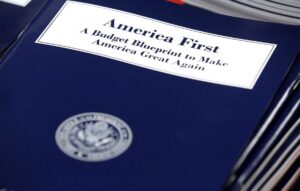Kenya’s President William Ruto has asked his Cabinet Secretaries to act fast to deliver on his administration’s development programmes, “with speed and efficiency”.
“We made important promises to the people of Kenya, especially those at the bottom of the economic pyramid. And we must deliver,” the president said.
According to Ruto, there are no excuses not to deliver his mandate adding that the government must work as a team and drive the interests of the people.
He was speaking at a cabinet retreat on the implementation of the government’s development priorities for 2023.
In the run up to the August 2022 General Elections, Ruto gave a number of promises under his bottoms-up economic plan.He unveiled a five-point manifesto dubbed ‘The Plan’, which he said would address Kenya’s economic challenges.
Economic recovery in a post-Covid era was one of his main objectives. Ruto also pledged to invest at least Sh250 billion in five years, effective this year, to boost agriculture and food security.
The government also has plans extend Sh50b annually to MSMEs as part of initiatives to ensure access to reliable credit. These are just but a few initiatives that could shift patterns on the sectors contribution to the country’s GDP.
As the year closed, the self-proclaimed “Hustler” launched the Financial Inclusion Fund dubbed “Hustler Fund”, which he believes will improve access to credit and support growth of enterprises.
“The more you repay your loan, the more you can borrow, “the President said during the launch of the fund in Nairobi.
He said the facility would also liberate people from predatory lenders.
“We are establishing a culture of saving, investment and social security,” he added.
But will his plan work?
The World Bank and the International Monetary Fund (IMF) have raised concerns on Kenya’s debt which stood at Sh8.7 trillion as of October 2022.
The figures have however gone up with the disbursement $433 million (Sh54.8 billion) by IMF in December, which is part of the $2.34 billion loan approved in May 2021.
Ruto’s government is keen on increasing revenue collection and cutting budget spending as a way of taming the appetite for loans.
President Ruto directed the National Treasury to cut the 2022/23 budget by Sh300 billion which he believes will help the government save on recurrent expenditure. Tax reforms form a larger part of Ruto’s economic policies as the country navigates recovery in post Covid-19 pandemic era. Through the country’s National Treasury, he is pushing for expansion of the taxbase.
“We must move our revenue collection from Sh2.1 trillion to between Sh4 trillion and Sh5 trillion,” the President recently said.
He is seen to target Kenya’s super-rich and high-income earners with higher tax bands, a move that is likely to rattle the few wealthy individuals in the country but has the potential to jerk up collections by the taxman.
Subsidies
When the going got tough in 2021, former President Uhuru Kenyatta introduced a number of subsidies to cushion households from high cost of living, mainly on fuel, maize and electricity.
While this might have been motivated by the 2022 election campaigns, Kenyans got a temporary reprieve. However, the move ate into the country’s revenue basket with the government forgoing billions in potential tax.
The fuel subsidy alone saw the government forego more than Sh80 billion, a significant amount in the country’s budget. Ruto, however, has done away with subsidies; a move analysts say is positive supporting government spending.
The President during his New Year address said the move to suspend subsidies after taking power was the right decision, terming them unsustainable and a risk to the economy.
“We had to do away with those subsidies or they would cost our economy big time,” Ruto said.
Meanwhile, the Kenyan government is also keen on bumping remittance inflows into the country which remain a key buffer on the local currency, mainly by its contribution to forex reserves.
Kenyans living and working abroad sent home a record Sh453.6 billion to family and friends in the eleven months to November last year, despite tough economic times in the wake of run away inflation and the Russia-Ukraine war.
This is double the Sh215.4 billion sent home in a similar period in 2017, Central Bank of Kenya (CBK) data shows.The inflows have continued to support the Kenyan shilling even as it remains exposed to the US Dollar, exchanging at an average Sh123.72 this week.
“The foreign exchange market remained stable in the six months to October 2022, despite increased uncertainties in the global financial markets and a stronger US dollar. This stability was supported by improvement in receipts from exports of goods and services as well as resilient remittances,” CBK says in a report.
According to the apex bank, diaspora remittances averaged $324.4 million per month in the six months to October 2022, compared to $ 341.6 million per month in the six months to April 2022.
Photo/Twitter
To further improve access to loans by SMEs and startups, Ruto is expected to launch a second Hustler Fund in February.
Kenyans will be able to borrow larger amounts ranging from Sh100,000 to Sh2.5 million, according to Cooperatives and MSME Development Cabinet Secretary Simon Chelugui.
It is a wait and see if Ruto’s plan will help survival and growth of SMEs in the country.
Statistics by the Kenya National Bureau of Statistics show that at least 400,000 SMEs die annually in Kenya, with almost 90 per cent not making to their second birthday. Lack of affordable credit facilities is one of the major reasons for the collapse
Trade deals
At the same time, Ruto is keen to address the country’s trade deficit which widened by 15.8 per cent in the third quarter of 2022, pushed by an increase in the importation of petroleum products and fertiliser.
The Economic Survey 2020 indicates Kenya’s trade deficit widened to Sh1.407 trillion in 2021 as the value of imports far outweighed export earnings.
The value of imports was Sh2.151 trillion up from Sh1.643 trillion in 2020, a 30.9 per cent growth.
This offset gains made in exports earnings which grew 15.5 per cent to Sh743.7 billion, up from Sh643.7 billion the previous year.
Kenya’s Investments, Trade and Industry CS Moses Kuria has been on a charm offensive in the UAE and Saudi Arabia to push for stonger bi-lateral ties.
Trade and investment were on the fore pages of the Cabinet Secretary’s playbook with key focus areas being manufacturing, transport and logistics, trade, tech, real estate and construction among others.
Ruto is also keen to build stronger ties with the US as part of growing Kenya’s economy mainly in manufacturing, with export processing zones on the offing.
“Kenya is ready for more trade deals with the US under the AGOA programme,” Ruto said when he recently hosted a US delegation led by US Deputy Secretary of Agriculture, Jewel Bronaugh, at State House Nairobi.
Other markets the government is keen on include Asia and the European Union.
Ruto is also seen to push for more trade and investment with Kenya’s East African Community (EAC) peers, for economic benefits. According to Ruto, his government has put in place all possible strategies to revive the economy, which he blames his former boss’leadership of destroying.
He has asked to be given time to revive the economy, with experts saying it could take up to one year for the impact to be felt.
“I have decided that before doing all other things, I will give first priority towards rebuilding the foundation of our economy,” Ruto said during a Christmas function in his hometown of Eldoret.




